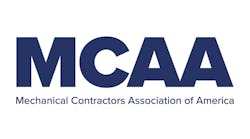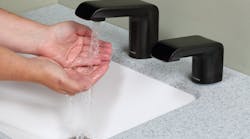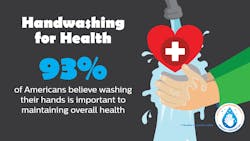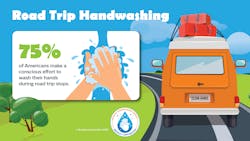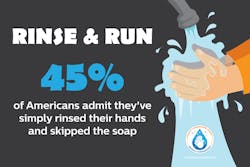Latest from Around the Web
Sponsored
MENOMONEE FALLS, WI — While Americans don’t agree on much these days, the overwhelming majority do agree that handwashing is important. According to the Healthy Handwashing Survey™ from Bradley Corporation, 93% of adults believe handwashing is essential to maintaining their overall health—a sentiment that’s nearly universal across gender, age and geography.
The survey also found that many Americans turn to handwashing to stay healthy before a trip, while they are traveling and before special occasions.
“Handwashing, using soap and warm water, is an easy and effective way to reduce the spread of disease-causing organisms,” says medical microbiologist Michael P. McCann, Ph.D., professor and chair of biology, Saint Joseph's University. “Given the ease with which some of these organisms can be spread on solid surfaces, in food, and by other means, handwashing is something that everyone should do after activities like using the restroom."
In addition to the physical benefits, there are emotional upsides. Almost 70% say they feel healthier or safer immediately after washing their hands.
Handwashing Personas
· 51% categorize themselves as “Rule Followers.” They apply soap, lather it up, scrub completely, rinse and then dry.
· 35% put themselves in the “Lather and Linger” group, meaning they do a very thorough job of lathering and washing.
· 33% relate to “Twice as Good,” saying they always use two pumps of soap.
· 20% utilize the “Human Dryer” method of wiping their hands on their clothing after washing and 17% selected “Air It Out,” admitting they wash but rely on air drying.
Finally, two categories made the bottom of the list. 14% self-identified as “Rinse and Run,” using just water but forgoing soap and drying and 3% put themselves in the “Skip It All” camp due to not having time to wash their hands.
Negative Impressions
The survey found that 65% of Americans have a particularly negative impression when they see someone who doesn’t wash their hands after using a restroom. 40% say someone who frequently touches their nose, mouth or eyes is also a turn off.
For businesses, poor restroom maintenance makes more than just a negative impression; an unclean or unpleasant restroom can be a sales inhibitor. 52% say an unkempt restroom impacts whether or not they’ll return to the establishment again.
On the flip side, nearly 60% say they are likely to spend more at a business that has clean, well-maintained restrooms and the same percent will make a point of stopping at a location that offers pleasant facilities.
Germ Avoidance Techniques
In public restrooms, Americans are keenly aware of coming into contact with germs and take a variety of evasive measures.
62% use a paper towel to avoid touching toilet flushers and faucet and door handles. 43% operate the flusher with their foot, especially women. 31% hover over the toilet seat and 27% open and close doors with their behind to eliminate contact.
With so much effort going into evading germs, it’s no wonder that 82% of adults believe it is important to have touchless fixtures in a public restroom.
“Germ avoidance and handwashing diligence are two habits that should always be a priority, and businesses can support hand hygiene by providing well-maintained restrooms,” says Jon Dommisse, vice president of marketing and corporate communication for Bradley Corp. “No matter where you are or what you’re doing, everyone should lather up, scrub thoroughly, rinse and dry their hands.”
The annual Healthy Handwashing Survey from Bradley Corp. queried 1,025 American adults Jan. 4-10, 2023, about their handwashing habits, concerns about the coronavirus and flu and their use of public restrooms. Participants were from around the country and were fairly evenly split between men (45%) and women (55%).
For more information, visit www.bradleycorp.com/handwashing.
